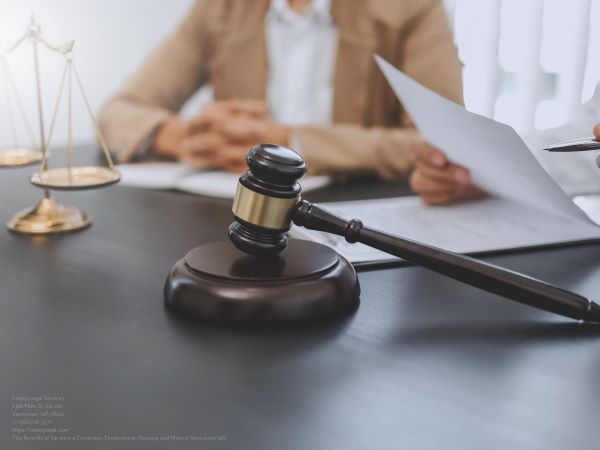How Clearing Your Record Can Open New Doors Across Washington State
A criminal conviction can follow you for years, limiting where you work, where you live, and how you rebuild your life. The good news is that under Washington State law, some convictions can be vacated — effectively removed from your public record. This process is often misunderstood, but it can change the trajectory of your future.
At Carley Legal Services, our expungement attorney in Vancouver, WA, helps clients pursue vacating old convictions so they can pass background checks, access better housing, and move forward without the shadow of their past.
What Does It Mean to Vacate a Conviction?
Vacating a conviction means the court sets aside your guilty verdict and dismisses the case. This doesn’t erase the past entirely — law enforcement and courts can still see it — but for most purposes, it is treated as if the conviction never happened. Employers, landlords, and licensing boards cannot use it against you.
How Vacating Differs from Expungement or Sealing
Many people confuse vacating, expungement, and sealing, but they are very different:
- Expungement deletes the record entirely. Under Washington law, this usually applies only to non-conviction data like dismissed charges or arrests for charges where no conviction resulted.
- Vacating removes a conviction from your publicly accessible criminal record, showing it as dismissed.
- Sealing hides a record from the public but does not erase it. Sealed records can be unsealed by a court order and are still accessible to law enforcement.
Vacating is the most common and realistic option for people with old criminal convictions who want a true second chance. It’s an official acknowledgment from the court that you’ve completed your obligations and demonstrated rehabilitation.
Do You Need A Trusted Expungement Attorney in Vancouver, WA?
Don’t wait—Call Carley Legal Services today for a free consultation and a clear plan forward!
The Importance of Vacating: Practical Advantages
A conviction affects far more than just your court sentence. It creates long-term barriers that can persist for decades. Vacating lifts many of those barriers.
Employment Opportunities
Even a minor misdemeanor can make it hard to get hired. Many employers run background checks and eliminate anyone with a criminal record before considering their skills or experience.
Vacating a conviction allows you to legally say you have not been convicted of that crime. It removes it from most public background searches and makes it far less likely to affect hiring decisions. This can be life-changing if you work in fields that require trust, licenses, or security clearances.
Housing Access
Landlords frequently deny housing to anyone with a criminal record. Vacating helps remove this barrier by clearing the conviction from your public record. When property managers screen your criminal history, they will no longer see the vacated conviction, giving you a fair chance to secure safe and stable housing.
Professional Licensing
Many professional licenses — in healthcare, education, finance, and trades — are restricted for people with certain convictions. Vacating shows state licensing boards that you have completed your sentence, stayed law-abiding, and earned a clean slate. You can legally declare that you were never convicted of this charge in the first place. This can be essential if you are pursuing a new career or trying to renew a license.
Personal and Social Benefits
The benefits go beyond paperwork. Clearing a conviction can boost your confidence, reduce stigma, and allow you to rebuild relationships without the constant fear of judgment. It’s often a crucial step toward truly moving on from your past.
Eligibility and Legal Requirements Under Washington State Law
Vacating isn’t automatic — you must meet specific requirements under Washington State Supreme Court precedent and statutes.
For misdemeanors and gross misdemeanors:

- You cannot currently have any pending criminal charges against you.
- You must have completed all terms of your sentence.
- At least 3 years must have passed (5 for domestic violence misdemeanors).
- You must have no new criminal charges or convictions.
- The offense cannot be a DUI, Physical Control, or certain violent crimes.
- If you are vacating reckless driving or negligent driving and the case was originally charged as a DUI, it has been at least 10 years since your conviction.
- If vacating a domestic violence conviction, you cannot have any previous domestic violence convictions.
- You cannot be currently subject to any No-Contact Orders.
For felony convictions:
- You must have received a Certificate of Discharge – a document that states you have finished all the terms of your sentence, including financial and non-financial obligations.
- At least 5 years must have passed since your conviction for a class C felony or 10 years for a class B felony.
- For a class C felony, at least 5 years have passed since your conviction of any subsequent crimes.
- For a class B felony, at least 10 years have passed since your conviction of any subsequent crimes.
- The offense cannot be a class A felony, a violent felony, or a sex offense.
- You cannot have any pending criminal charges.
- You cannot vacate a violent offense, except Assault 2, Assault 3 when not committed against a police officer, and Robbery 2 may all be vacated if the charge did not involve a firearm, deadly weapon, or sexual motivation enhancement.
Your expungement lawyer in Vancouver, WA, will review your case to confirm eligibility before filing. Every case is different, and having a good lawyer navigate the criminal justice system ensures you don’t waste time on an ineligible petition.
The Process of Vacating a Conviction
Vacating requires careful legal steps, and small mistakes can delay or derail the process.
Step 1: Case Review and Record Collection
Your attorney will collect your criminal history, sentencing records, and proof of compliance. This includes payment of fines, completion of probation or treatment, and confirmation that no criminal charges are pending.
Step 2: Filing the Petition
Next, your attorney files a petition for expungement or vacation in the original court. This document must meet detailed legal standards and explain why you qualify. Courts often reject incomplete or inaccurate petitions, so precise legal drafting is critical.
Step 3: Court Hearing
In most cases, your attorney can appear for you. The judge will review your record, ask questions, and determine whether you meet the legal requirements.
If granted, the court enters an Order of Expungement or Vacation Order and sends it to the Washington State Patrol and other law enforcement agencies to update their records.
Step 4: Record Updates
After the order is processed, the conviction is removed from your public record. It should no longer appear on most background checks, and you can lawfully state you have never been convicted of that crime.
Common Misconceptions About Vacating Convictions
Many people avoid pursuing a vacation because they misunderstand the process.
“My record clears after seven years.”
False. Your criminal record does not disappear with time. Old criminal convictions remain until the court orders their removal.
“Vacating restores firearm rights.”
Also false. Vacating does not automatically restore your Second Amendment firearm rights. A separate legal process called firearm rights restoration is required.
“Employers won’t see old convictions.”
If you don’t vacate a conviction, it can show up decades later on background checks. This often surprises people who believed their record would fade away.
“It’s just a formality.”
Vacating is a formal legal process with strict Washington law requirements. It requires time, legal strategy, and accurate filings to succeed.
Effective Strategies for a Successful Petition
Because vacating a conviction is complex, preparation is critical.
First, work with an experienced attorney. A skilled criminal defense lawyer who understands the expungement process can evaluate your criminal history, confirm your eligibility, and avoid common filing errors.
Second, be thorough with documentation. Gather proof you completed all conditions, including payments, treatment, and probation. Courts will not approve your petition without evidence.
Third, understand timelines. Courts require specific waiting periods for class B felony and class C felony convictions. Filing early can result in denial, even if you are close to eligibility.
Fourth, budget for attorney fees. Prices vary depending on your case and complexity, so request a clear estimate. Many firms, including Carley Legal Services, offer flat-fee options for predictable costs.
Finally, be patient and persistent. Clearing your criminal record takes time, but the benefits — from job opportunities to personal peace of mind — make the effort worthwhile.
Rebuild Your Future with Carley Legal Services — Your Trusted Expungement Attorney in Vancouver, WA
Vacating a conviction can transform your life. It clears barriers to jobs, housing, and licenses, and helps you rebuild your future without the stigma of a criminal conviction. While the process is technical, the rewards are enormous.
If you are ready to move forward, contact Carley Legal Services today to speak with an experienced expungement attorney. We’ll review your case, guide you through the legal process, and fight to help you clear your record.
For trusted, results-driven record clearing, choose Carley Legal Services — your experienced expungement attorney in Vancouver, WA.
Other Legal Services We Provide
- Assault Charges in Vancouver, WA: At Carley Legal Services, we defend individuals facing misdemeanor and felony assault charges, protecting your rights, freedom, and reputation.
- Domestic Violence Attorney in Vancouver, WA: We provide strategic, compassionate representation in domestic violence cases, guiding you through these sensitive matters while safeguarding your future.
- Driver License Lawyer in Vancouver, WA: We help you fight license suspensions, represent you at DOL hearings, and pursue license reinstatement after driving-related offenses.
- DUI Lawyer in Vancouver, WA: Defending your rights, challenging DUI evidence, and protecting your license, record, and future.
- Felony Charges in Vancouver, WA: We deliver aggressive defense against serious felony accusations, focused on minimizing penalties and protecting your future.
- Gun Rights in Vancouver, WA: We help you navigate Washington gun laws and fight to restore your firearm rights after disqualifying convictions.
- Theft Lawyer in Vancouver, WA: We defend against theft, shoplifting, and property crime accusations, working to reduce charges and protect your record.
- Traffic Lawyer in Vancouver, WA: We represent you in traffic-related cases—from speeding to reckless driving—helping you avoid costly penalties and license consequences.
Do You Need A Trusted Expungement Attorney in Vancouver, WA?
Don’t wait—Call Carley Legal Services today for a free consultation and a clear plan forward!


